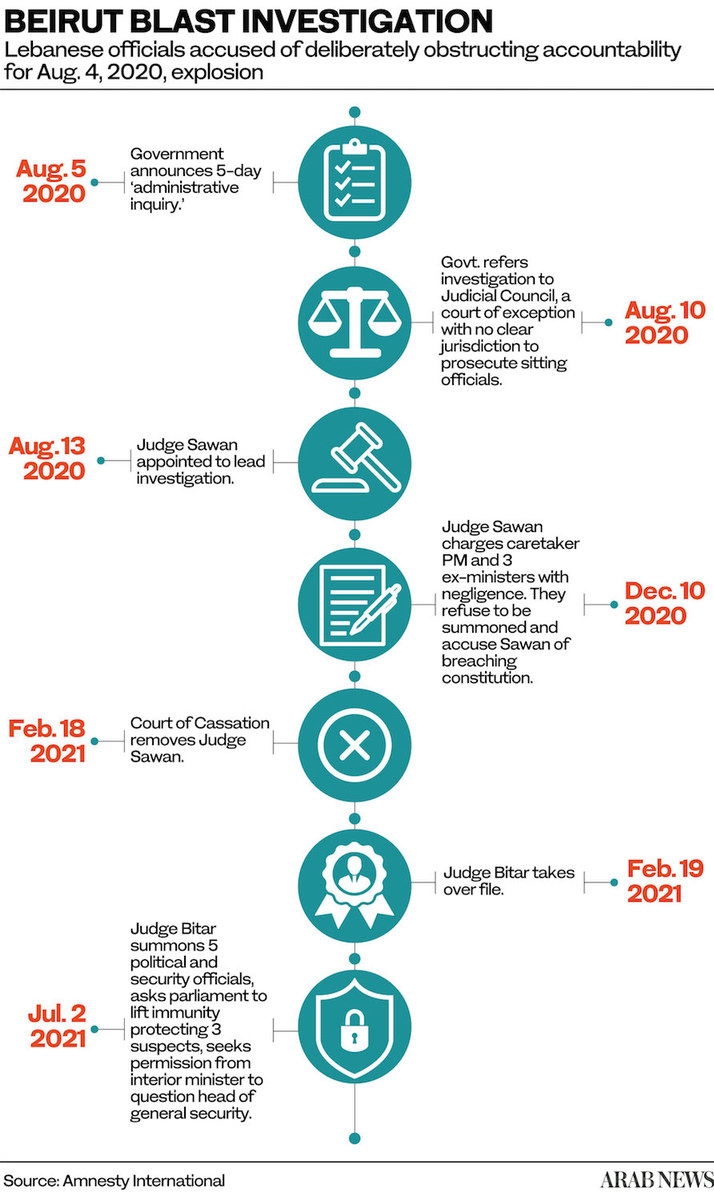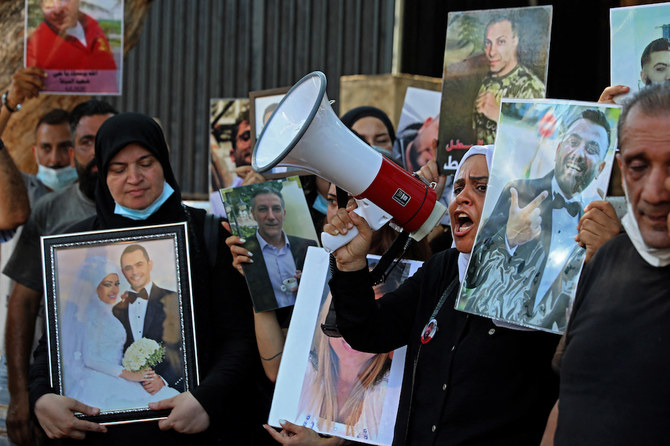BEIRUT: A year after narrowly avoiding death, Hadi’s heart still races when he hears sudden loud noises. The 27-year-old was lucky to survive when, on Aug. 4, 2020, a huge cache of ammonium nitrate ignited inside a warehouse at the Port of Beirut, close to his home in the Mar Mikhael neighborhood.
At least 217 people were killed, more than 6,500 injured, and at least 300,000 left homeless by the resultant blast, which devastated Lebanon’s main port. It was equivalent to the force of 1.1 kilotons of TNT and caused damage to buildings up to 20 kilometers away.
Despite promising the victims and their families that justice would be swift, Lebanese authorities are yet to hold anyone accountable.

“It was fight or flight after the explosion,” Hadi, who declined to give his full name, told Arab News in advance of the first anniversary of the blast.
“I packed whatever I could find. In my mind this was the first bomb out of hundreds more to come — and if this was the first one, God knows what was coming.”
After scrambling out of his apartment block with whatever he could carry, Hadi found that the surrounding streets he knew so well were damaged beyond recognition.
“The sights I saw that day after leaving the building were absolutely petrifying,” he said. “People lying on rugs, gushing blood. Some without arms, some without legs, scarred all over, as people were trying to help them. Cars in the middle of the road, destroyed, gasoline leaking on the streets. No one understood what was going on.”
INNUMBERS
* 300,000 - People left homeless.
* 70,000 - Jobs lost after the explosion.
* 163 - Schools destroyed.
* 6 - Hospitals destroyed.
* 0 - Number of people sentenced over blast.
Source: UN
Thousands of Beirut residents have similarly bitter memories of a day that proved to be the bloodiest and arguably most painful since the end of the civil war. The explosion, which was so powerful it was felt in Cyprus, more than 200km away, was one of the biggest non-nuclear blasts in history.
The world was horrified by images and video footage on social media and news broadcasts that showed the scale of the damage caused by the shock wave that rocked the city, the destruction in the streets, and the dirty-pink mushroom cloud hanging over the city.
Among the youngest victims were two-year-old Isaac Oehlers and three-year-old Alexandra Naggear. But equally tragic is the number of lives the explosion continues to claim indirectly.
“We continue to hear about people losing their lives to suicide every day, and we continue to be overwhelmed with requests for psychological support, with an ongoing waiting list of 70 to 100 patients in our clinics every month,” Mia Atoui, a clinical psychologist and co-founder of Embrace, a nonprofit organization dedicated to mental health, told Arab News.

A wounded man receives help outside a hospital following the explosion. (AFP/File Photo)
A year after the blast, Embrace’s public helpline, called National Lifeline, is receiving more than 1,100 calls each month. Staff at its free clinic conduct more than 500 mental health consultations a month.
“It has indeed been a turbulent year,” Atoui said. “There is a collective sense of depression and anxiety among every person you meet and talk to. People are down, worried, hopeless, helpless, despaired and unable to enjoy any of life’s pleasures.”
The aftermath of the Beirut explosion is just one of a multitude of overlapping crises blighting a country wracked by an ongoing economic crisis, mass unemployment, a fresh wave of coronavirus infections, and shortages of fuel and electricity — all of which is made worse by seemingly endless political paralysis.
Lebanon has been experiencing a socio-economic implosion since 2019. In the autumn of that year, nationwide protests erupted over rampant corruption among the political class that has ruled the country since the end of the civil war under a sectarian banner.

On August 4, 2021 Lebanon will mark the first anniversary of the devastating port blast that thundered through the city, levelling entire neighbourhoods, killing more than 200 people and wounding 6,500 others. (AFP/File Photo)
Public anger grew when an economic meltdown caused the nation’s currency to lose 90 percent of its value and the banks held depositors’ money hostage. Thousands of young people have fled abroad. Those who remain struggle to get by, often turning for help to a flourishing black market.
But the trauma caused by the port explosion and its aftermath has been compounded by the failure of the government to move forward with its investigation into the disaster.
“The lack of accountability is triggering on all fronts,” Atoui said. “It not only leaves our wounds open, it reinforces the idea that our lives don’t matter, that the lives of our loved ones we have lost don’t matter and are of no value. It means that we cannot feel safe or secure again.
“It threatens our existence, both present and future, and there is nothing more painful, more distressing and more overwhelming to our quality of life than the sense of injustice and living in an unjust world where your rights are robbed.”

UGC footage filmed from an office building shows a fireball exploding while smoke is billowing during the chemical explosion at the port. (AFP/Mouafac Harb/Handout/File Photo)
The Lebanon Relief Network, a digital platform launched after the blast to help individuals affected by it to connect with trauma experts and therapists, considers the failure to deliver justice and accountability a recipe for long-term mental illness.
“The lack of accountability reduces trust in communities and has a significant negative effect on mental health. This is clearly exacerbated in times of crisis,” the network said in a statement to Arab News.
The FBI reportedly estimated that about 552 tons of ammonium nitrate exploded inside the Beirut port warehouse on August 4, much less than the 2,754 tons that arrived on a Russian-leased cargo ship in 2013. The Reuters news agency said the FBI report did not give any explanation for the discrepancy, or where the rest of the shipment might have gone.
Amnesty International, the international rights-advocacy group, has accused Lebanese authorities of “shamelessly obstructing victims’ quest for truth and justice” in the months since the blast, actively shielding officials from scrutiny and hampering the course of the investigation.

An aerial view shows the massive damage at Beirut port's grain silos and the area around it, one day after the explosion. (AFP/File Photo)
In February, Lebanese authorities dismissed the first judge appointed to lead the investigation after he summoned political figures for questioning. So far they have rejected requests by his replacement to lift the immunity granted to officials, and to question senior members of the security forces.
Leaked official documents indicate that Lebanese customs officials, military and security chiefs, and members of the judiciary warned successive governments about the danger posed by the stockpile of explosive chemicals at the port on at least 10 occasions during the six years it was stored at the port, yet no action was taken.
MPs and officials are clinging to their right to immunity, effectively shielding suspects whose actions are blamed for causing the explosion, and denying thousands of victims the justice they demand.
FASTFACTS
* Victims of the blast have seen little accountability, despite promises that justice would be swift.
* The blast killed more than 200 people, injured 6,500 and made at least 300,000 homeless.
“Lebanese authorities promised a swift investigation; instead they have brazenly blocked and stalled justice at every turn, despite a tireless campaign for justice and criminal accountability by survivors and families of victims,” said Lynn Maalouf, Amnesty International’s deputy director for the Middle East and North Africa (MENA).
“The Lebanese government tragically failed to protect the lives of its people, just as it has failed for so long to protect basic socioeconomic rights. In blocking the judge’s attempts to summon political officials, the authorities have struck yet another blow to the people of Lebanon. Given the scale of this tragedy, it is astounding to see how far the Lebanese authorities are prepared to go to shield themselves from scrutiny.”
According to a report this year by the Konrad-Adenauer-Stiftung Regional Program Political Dialogue and Regional Integration South Mediterranean, Lebanon ranks lowest in the MENA region in terms of public trust in the national government, parliament, prime minister, head of state and local government — all of which are rated below 28 percent.
In the absence of trusted government institutions, civil-society groups have been forced to step in to address the widespread mental trauma caused by the explosion, and to feed and provide new homes for people who lost everything.

Wounded people, just a few of the estimated 6,500 who were injured in the explosion, are pictured outside a hospital following the blast. (AFP/File Photo)
“People are asking for different kinds of support, but many right now have asked for support to deal with the trauma of the blast — many are seeking support for the first time, one year after the traumatic event,” Atoui said.
“This reinforces the fact that the long-term effects of the blast will persist for many years and that the healing process is a long journey. Many people will need ongoing support.”
Hadi, the Beirut resident, said he returned to the Mar Mikhael neighborhood only once after the blast, to salvage what remained of his possessions. He now lives in a part of the city far away from the port and anything that could trigger him.
-----------------
Twitter: @Tarek_AliAhmad




























